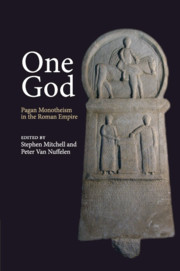Book contents
- Frontmatter
- Contents
- Preface and acknowledgements
- List of abbreviations
- 1 Introduction: the debate about pagan monotheism
- 2 Pagan monotheism as a religious phenomenon
- 3 Pagan ritual and monotheism
- 4 The case for pagan monotheism in Greek and Graeco-Roman antiquity
- 5 Monotheism between cult and politics: the themes of the ancient debate between pagan and Christian monotheism
- 6 The price of monotheism: some new observations on a current debate about late antiquity
- 7 Megatheism: the search for the almighty god and the competition of cults
- 8 Deus deum … summorum maximus (Apuleius): ritual expressions of distinction in the divine world in the imperial period
- 9 Further thoughts on the cult of Theos Hypsistos
- Bibliography
- General index
- Index of authors, works and citations
3 - Pagan ritual and monotheism
Published online by Cambridge University Press: 20 May 2010
- Frontmatter
- Contents
- Preface and acknowledgements
- List of abbreviations
- 1 Introduction: the debate about pagan monotheism
- 2 Pagan monotheism as a religious phenomenon
- 3 Pagan ritual and monotheism
- 4 The case for pagan monotheism in Greek and Graeco-Roman antiquity
- 5 Monotheism between cult and politics: the themes of the ancient debate between pagan and Christian monotheism
- 6 The price of monotheism: some new observations on a current debate about late antiquity
- 7 Megatheism: the search for the almighty god and the competition of cults
- 8 Deus deum … summorum maximus (Apuleius): ritual expressions of distinction in the divine world in the imperial period
- 9 Further thoughts on the cult of Theos Hypsistos
- Bibliography
- General index
- Index of authors, works and citations
Summary
The Quarrels and Divisions of Religion were Evils unknown to the Heathen. The reason was because the Religion of the Heathen consisted rather in Rites and Ceremonies than in any constant belief. For you may imagine what kind of Faith theirs was when the chief Doctors and Fathers of their Church were the Poets.
Francis Bacon, ‘Of Unity in Religion’ (1622)INTRODUCTION
Bacon is here making ― in a characteristically short space ― three separate points, all of them still much in contention today; his thought will provide the starting points for this paper. First, he is claiming that religious life in antiquity was not the site of specific conflicts. Others were later to turn this into one of the virtues of pagan religious life, its toleration of religious difference, but in this passage (virtually an aside) it is hard to detect a tone of anything but detachment from what the ‘heathens’ did. No doubt, it was a benefit that there should have been no ‘religious’ wars, but he is surely not making a claim for toleration as such. Secondly, he is seeing a contrast between matters of belief, or at least constancy of belief, and the maintenance of ritual traditions; and seeking to explain the freedom from religious conflict as the result of greater concern with ritual than with belief. Conflict, he is assuming, arises from consciously expressed religious views.
- Type
- Chapter
- Information
- One GodPagan Monotheism in the Roman Empire, pp. 34 - 52Publisher: Cambridge University PressPrint publication year: 2010
- 7
- Cited by

